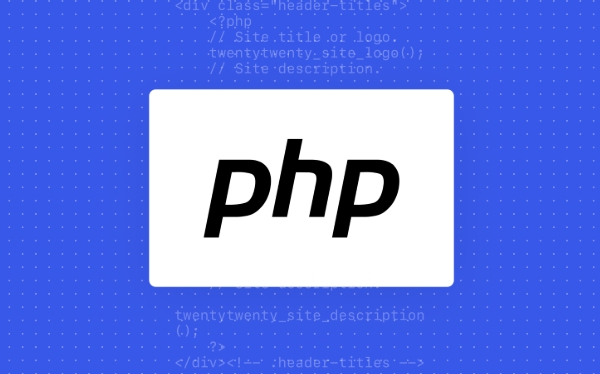 Backend Development
Backend Development
 PHP Tutorial
PHP Tutorial
 Mastering PHP Closures and the `use` Keyword for Lexical Scoping
Mastering PHP Closures and the `use` Keyword for Lexical Scoping
Mastering PHP Closures and the `use` Keyword for Lexical Scoping
Aug 01, 2025 am 07:41 AMPHP closures with the use keyword enable lexical scoping by capturing variables from the parent scope. 1. Closures are anonymous functions that can access external variables via use. 2. By default, variables in use are passed by value; to modify them externally, use &$variable for reference. 3. Common use cases include callback functions with context, deferred execution like event handlers, and dependency injection without classes. 4. Avoid common pitfalls such as unnecessary variable capture and incorrect loop variable binding—though PHP correctly binds loop variables in use by value per iteration, unlike JavaScript. 5. Best practices include using value semantics unless mutation is needed, choosing clear variable names, and being cautious with references. When used properly, closures enhance code modularity and readability by encapsulating logic with controlled access to external state.

PHP closures — especially when combined with the use keyword — are powerful tools for creating flexible, encapsulated code. While they might seem tricky at first, understanding how they work with lexical scoping unlocks cleaner, more maintainable code patterns.

Let’s break down how closures work in PHP, why the use keyword matters, and how to use them effectively.
What Is a Closure in PHP?
A closure is an anonymous function that can capture variables from the surrounding (enclosing) scope. Unlike regular functions, closures can "remember" variables even after the parent scope has finished executing.

$greeting = "Hello";
$sayHello = function($name) use ($greeting) {
echo "$greeting, $name!\n";
};
$sayHello("Alice"); // Output: Hello, Alice!Here, the closure uses the $greeting variable from the outer scope via the use keyword.
How use Enables Lexical Scoping
The use keyword allows a closure to import variables from the parent scope into its own scope. This is called lexical scoping — the closure "closes over" the variables it references.

Key Rules of use:
- Variables are copied by value by default.
- To modify a variable inside the closure and reflect changes outside, you must pass it by reference using
&. - You cannot use
$thisin a closure unless it's inside a class context (and even then, it's automatically available).
Example: Value vs Reference
$count = 0;
// By value (default)
$incrementByValue = function() use ($count) {
$count ;
};
$incrementByValue();
echo $count; // Still 0
// By reference
$incrementByReference = function() use (&$count) {
$count ;
};
$incrementByReference();
echo $count; // Now 1?? If you need the closure to affect external state, always use
&$variable.
Practical Use Cases for Closures and use
Closures shine in scenarios where you want to encapsulate logic with configuration or delay execution.
1. Callback Functions with Context
When passing callbacks, you often need to include context that isn’t part of the function arguments.
function filterByThreshold($items, $min) {
return array_filter($items, function($item) use ($min) {
return $item >= $min;
});
}
$numbers = [5, 10, 15, 20];
$filtered = filterByThreshold($numbers, 12);
// Result: [15, 20]Here, $min is passed into the closure via use, making the filter logic clean and reusable.
2. Event Handlers or Deferred Logic
Closures can capture environment state for later execution.
$logger = function($message) {
echo "[" . date('Y-m-d') . "] $message\n";
};
$onUserLogin = function($username) use ($logger) {
$logger("User '$username' logged in.");
};
$onUserLogin("Bob");
// Output: [2025-04-05] User 'Bob' logged in.Even if the original $logger changes later, the closure keeps its own copy (or reference).
3. Dependency Injection Without Classes
Sometimes, you don’t need a full class — just a self-contained unit of logic with dependencies.
function createMultiplier($factor) {
return function($number) use ($factor) {
return $number * $factor;
};
}
$doubler = createMultiplier(2);
$tripler = createMultiplier(3);
echo $doubler(5); // 10
echo $tripler(5); // 15This pattern is lightweight and readable — perfect for utility functions.
Common Pitfalls and Best Practices
- ? Don’t
useunnecessary variables — it clutters the closure and can cause memory leaks. - ? Prefer value semantics unless you explicitly need to modify the outer variable.
- ? Use meaningful variable names in closures — they’re not always obvious when debugging.
- ? Be careful with loops — a common mistake is capturing loop variables incorrectly.
Gotcha: Loop Variable Binding
$functions = [];
for ($i = 0; $i < 3; $i ) {
$functions[] = function() use ($i) {
echo $i . "\n";
};
}
foreach ($functions as $f) {
$f();
}
// Output: 3, 3, 3 — not 0, 1, 2!Why? Because $i is used by value after the loop finishes (where $i === 3). To fix it:
for ($i = 0; $i < 3; $i ) {
$functions[] = function() use ($i) {
echo $i . "\n";
};
}Wait — same code? Actually, in PHP, this works correctly because each iteration creates a new scope for use. So this does output 0, 1, 2. (Unlike JavaScript, PHP handles this better.)
But if you were modifying $i by reference, or reusing it, issues could still arise.
Summary
- Closures are anonymous functions that can capture variables via
use. -
useimports variables by value unless prefixed with&for reference. - They’re ideal for callbacks, configuration, and encapsulating logic with context.
- Be mindful of scope, mutability, and loop behavior.
Used wisely, PHP closures make code more expressive and modular — no classes required.
Basically, just remember: use gives your closure access to the outside world, but only what you explicitly allow.
The above is the detailed content of Mastering PHP Closures and the `use` Keyword for Lexical Scoping. For more information, please follow other related articles on the PHP Chinese website!

Hot AI Tools

Undress AI Tool
Undress images for free

Undresser.AI Undress
AI-powered app for creating realistic nude photos

AI Clothes Remover
Online AI tool for removing clothes from photos.

Clothoff.io
AI clothes remover

Video Face Swap
Swap faces in any video effortlessly with our completely free AI face swap tool!

Hot Article

Hot Tools

Notepad++7.3.1
Easy-to-use and free code editor

SublimeText3 Chinese version
Chinese version, very easy to use

Zend Studio 13.0.1
Powerful PHP integrated development environment

Dreamweaver CS6
Visual web development tools

SublimeText3 Mac version
God-level code editing software (SublimeText3)
 Solving Complex Problems with Recursive Functions in PHP
Aug 02, 2025 pm 02:05 PM
Solving Complex Problems with Recursive Functions in PHP
Aug 02, 2025 pm 02:05 PM
Recursive functions are an effective way to solve complex problems in PHP, especially suitable for handling nested data, mathematical calculations, and file system traversals with self-similar structures. 1. For nested arrays or menu structures, recursion can automatically adapt to any depth, terminate through the basis example (empty child) and expand layer by layer; 2. When calculating factorials and Fibonacci sequences, recursion intuitively implements mathematical definition, but naive Fibonacci has performance problems and can be optimized through memory; 3. When traversing the directory, recursion can penetrate into any level subdirectories, which is simpler than iteration, but attention should be paid to the risk of stack overflow; 4. When using recursion, it is necessary to ensure that the base case is reachable, avoid infinite calls, and when the depth is large, it should be considered to use iteration or explicit stack substitution to improve performance and stability. So when the problem contains "smaller itself
 Memory-Efficient Iteration with PHP Generators and the `yield` Keyword
Aug 03, 2025 am 01:38 AM
Memory-Efficient Iteration with PHP Generators and the `yield` Keyword
Aug 03, 2025 am 01:38 AM
Use the PHP generator and yield keywords to effectively process large data sets to avoid memory overflow; 1. The generator realizes lazy evaluation by yield value, leaving only one value in memory at a time; 2. It is suitable for scenarios such as reading large files line by line, such as using fgets combined with yield line by line, and processing logs or CSV files line by line; 3. Support key-value pair output, and explicitly specify key names; 4. It has the advantages of low memory footprint, concise code, and seamless integration with foreach; 5. However, there are restrictions such as inability to rewind, do not support random access, and cannot be reused, and it needs to be recreated before iteration is performed; therefore, when it is necessary to traverse a large amount of data, the use of generators should be given priority.
 Embracing Functional Programming: Higher-Order Functions in PHP
Aug 03, 2025 am 02:12 AM
Embracing Functional Programming: Higher-Order Functions in PHP
Aug 03, 2025 am 02:12 AM
Higher-orderfunctionsinPHParefunctionsthatacceptotherfunctionsasargumentsorreturnthemasresults,enablingfunctionalprogrammingtechniques.2.PHPsupportspassingfunctionsasargumentsusingcallbacks,asdemonstratedbycustomfunctionslikefilterArrayandbuilt-infun
 The Evolution of Callbacks: First-Class Callable Syntax in PHP 8.1
Aug 03, 2025 am 10:00 AM
The Evolution of Callbacks: First-Class Callable Syntax in PHP 8.1
Aug 03, 2025 am 10:00 AM
PHP8.1didnotintroducefirst-classcallablesyntax;thisfeatureiscominginPHP8.4.1.PriortoPHP8.4,callbacksusedstrings,arrays,orClosures,whichwereerror-proneandlackedIDEsupport.2.PHP8.1improvedtheecosystemwithenums,fibers,andbettertypingbutdidnotchangecalla
 Harnessing the Power of Variadic Functions with the Splat Operator
Aug 03, 2025 am 06:21 AM
Harnessing the Power of Variadic Functions with the Splat Operator
Aug 03, 2025 am 06:21 AM
Thesplatoperator(...)inPHPisusedtocollectmultipleargumentsintoanarraywhendefiningafunctionandtounpackarraysoriterablesintoindividualargumentswhencallingafunction.2.Whendefiningafunction,suchasfunctionsum(...$numbers),allpassedargumentsarecollectedint
 Techniques for Simulating Function Overloading in PHP
Aug 03, 2025 pm 01:12 PM
Techniques for Simulating Function Overloading in PHP
Aug 03, 2025 pm 01:12 PM
PHP does not support function overloading like Java or C, but can be simulated through a variety of techniques; 1. Use default parameters and optional parameters to achieve different calling methods by setting default values for parameters; 2. Use variable-length parameter list (such as... operators), perform different logic according to the number of parameters; 3. Perform type checks within the function and change behavior according to the parameter type; 4. Use PHP8's named parameters to skip optional parameters by explicit naming and improve readability; 5. Based on parameter mode distribution, route to different processing functions by judging the number and type of parameters, which is suitable for complex scenarios; these methods have trade-offs and should be selected according to actual needs to ensure clear and maintainable code.
 Mastering PHP Closures and the `use` Keyword for Lexical Scoping
Aug 01, 2025 am 07:41 AM
Mastering PHP Closures and the `use` Keyword for Lexical Scoping
Aug 01, 2025 am 07:41 AM
PHPclosureswiththeusekeywordenablelexicalscopingbycapturingvariablesfromtheparentscope.1.Closuresareanonymousfunctionsthatcanaccessexternalvariablesviause.2.Bydefault,variablesinusearepassedbyvalue;tomodifythemexternally,use&$variableforreference
 Understanding PHP's Pass-by-Reference: Performance and Pitfalls
Aug 03, 2025 pm 03:10 PM
Understanding PHP's Pass-by-Reference: Performance and Pitfalls
Aug 03, 2025 pm 03:10 PM
Pass-by-referenceinPHPdoesnotimproveperformancewithlargearraysorobjectsduetocopy-on-writeandobjecthandles,soitshouldnotbeusedforthatpurpose;1.Usepass-by-referenceonlywhenyouneedtomodifytheoriginalvariable,suchasswappingvaluesorreturningmultiplevalues





